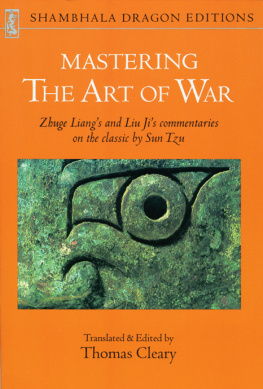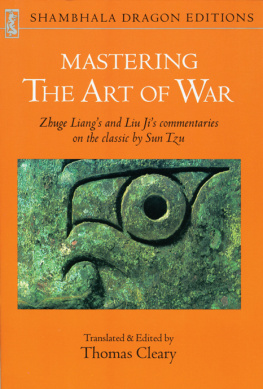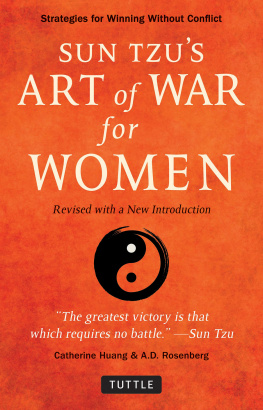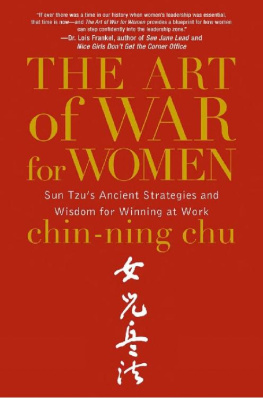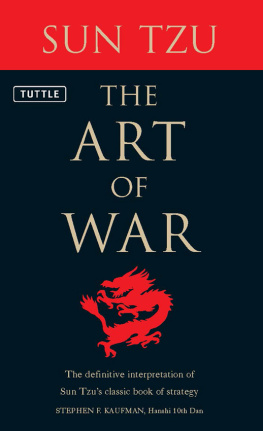ABOUT THE BOOK
Composed by two prominent statesmen-generals of classical China, this book develops the strategies of Sun Tzus classic, The Art of War, into a complete handbook of organization and leadership. The great leaders of ancient China who were trained in Sun Tzus principles understood how war is waged successfully, both materially and mentally, and how victory and defeat follow clear social, psychological, and environmental laws. Drawing on episodes from the panorama of Chinese history, Mastering the Art of War presents practical summaries of these essential laws along with tales of conflict and strategy that show in concrete terms the proper use of Sun Tzus principles. The book also examines the social and psychological aspects of organization and crisis management. The translators introduction surveys the Chinese philosophies of war and conflict and explores in depth the parallels between The Art of War and the oldest handbook of strategic living, the I Ching (Book of Changes).
THOMAS CLEARY holds a PhD in East Asian Languages and Civilizations from Harvard University and a JD from the University of California, Berkeley, Boalt Hall School of Law. He is the translator of over fifty volumes of Buddhist, Taoist, Confucian, and Islamic texts from Sanskrit, Chinese, Japanese, Pali, and Arabic.
Sign up to learn more about our books and receive special offers from Shambhala Publications.

Or visit us online to sign up at shambhala.com/eshambhala.
Mastering the Art of War

ZHUGE LIANG & LIU JI
TRANSLATED AND EDITED BY
Thomas Cleary

SHAMBHALA
Boston & London
2013
SHAMBHALA PUBLICATIONS, INC.
Horticultural Hall
300 Massachusetts Avenue
Boston, Massachusetts 02115
www.shambhala.com
1989, 2000 by Thomas Cleary
All rights reserved. No part of this book may be reproduced in any form or by any means, electronic or mechanical, including photocopying, recording, or by any information storage and retrieval system, without permission in writing from the publisher.
The Library of Congress catalogues the previous edition of this work as follows:
Mastering the art of war.
1. Sun-tzu, 6th cent. B.C. Sun tzu ping fa. 2. Military art and science. I. Chuko, Liang, 181234. II. Liu, Chi, 13111375. III. Cleary, Thomas F., 1949
eISBN 978-0-8348-2481-2
ISBN 978-0-87773-513-7 (paperback)
ISBN 978-1-59030-264-4 (Shambhala Library)
U101.S96M37 1989 355.02 89-10264
CONTENTS
The Chinese proper names in this book are transliterated in Pinyin, the most widely accepted method of romanization for Chinese. In actual usage, Chinese phonetics are so complex that a detailed treatment of Chinese pronunciation is outside the scope of this book. For the comfort and ease of the reader, however, it is useful to note a few letters that are commonly used in Pinyin spelling but are relatively uncommon in English and are given different values.
There are five consonants that are typically found to cause problems because of their special usage: c, q, x, z, and zh. The following chart represents rough equivalents to these consonants in English:
c resembles ts
q resembles ch
x resembles sh
z resembles dz
zh resembles j
Skilled warriors of old were subtle,
Mysteriously powerful,
So deep they were unknowable.
Tao Te Ching
Be extremely subtle
Even to the point of formlessness
Be extremely mysterious
Even to the point of soundlessness
Thereby you can be the director
Of an opponents fate
The Art of War
Change and movement have their times; safety and danger are in oneself. Calamity and fortune, gain and loss, all start from oneself. Therefore those who master change are those who address themselves to the time. For those who address themselves to the time, even danger is safe; for those who master change, even disturbance is orderly.
The Book of Balance and Harmony
The study and practice of strategic living in the midst of all situations and events have been a central concern of practical philosophers of all the great cultures since ancient times. In China, one of the oldest living civilizations on earth, the classical philosophers concerned themselves with humanitys struggle to survive and find security in the midst of endless change and movement. Many of the ancient teachers of wisdom were also artisans and scientists, seeking new strategies for living in their study of human nature and destiny; others were political and even military leaders, studying the most complex and difficult problems of society.
According to the philosophers of ancient China, when the pristine sociability of humanity had become distorted by personal ambitions, it fell into a state of perpetual inner war. This war manifested itself in social unrest, class conflict, and eventually armed aggression. From this time on the philosophers made it their particular concern to study mechanisms of human conflict and develop their understanding into practical sciences of crisis management.
For this reason, very early classical Chinese literature is already examining war deliberately, not only from the point of view of when and how to prosecute war, but also from the point of view of its impact on society and the resulting ethical implications. The Yin Convergence Classic, for example, is considered a most ancient Taoist text, believed to antedate even the Tao Te Ching (The Way and Its Power), having such consequent prestige that it is avidly studied by both social strategists and mystics: in a typically laconic manner this short work already summarizes the attitudes to war later adopted by various schools of thought, including the perennial Taoist and Confucian philosophies: Cut off one wellspring, that of profiteering, the classic says, and that is ten times better than mobilizing the army.
Later the Tao Te Ching, undoubtedly the most famous pure Taoist classic, elaborated on the theme of greed as the motive force underlying aggression:
When the world has the Way,
Running horses are retired to till the fields.
When the world lacks the Way,
War-horses are bred in the countryside.
No crime is greater than approving of greed,
No calamity is greater than discontent,
No fault is greater than possessiveness.
The same fundamental theme is carefully elaborated in the I Ching (Book of Changes), another early Chinese classic, one that is devoted, as the title suggests, to a science of mastering change, the basic fact of life. The same passage of the Yin Convergence Classic goes on to explain that cutting off the wellspring of greed begins at home: Introspect three times day and night, and that is ten thousand times better than mobilizing the army. This is also one meaning of the now proverbial line of the Tao Te Ching: The journey of a thousand miles begins with the first step, which from the original may also be translated, The journey of a thousand miles begins at your feet.
Later classics also follow this theory that social reform must begin within the individual, and the implication that inward renewal of conscience is ultimately more effective than external imposition of law. For this reason Chinese philosophers concluded that education was of ever-increasing importance to society as a whole. They often had radically different ideas about the kind of education they considered necessary, but all of them agreed to include the study of conflict. And as it turned out, in spite of the variety of their ideas on other subjects, the ancient Chinese philosophers often came to the same conclusions on conflict. Thus the classics on strategy in conflict, such as the famous handbook known as
Next page
